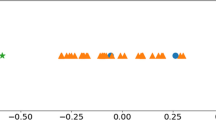Abstract
A general framework for the design of error adaptive learning algorithms in multiple output domains based on Dietterich’s ECOC approach, recursive error output correcting codes and iterative APP decoding methods is proposed. A particular class of these Recursive ECOC (RECOC) learning algorithms based on Low Density Parity Check is presented.
Access this chapter
Tax calculation will be finalised at checkout
Purchases are for personal use only
Preview
Unable to display preview. Download preview PDF.
Similar content being viewed by others
References
Dietterich, T., Bakiri, G.: Error-correcting output codes: A general method for improving multiclass inductive learning programs. Proceedings of the Ninth National Conference on Artificial Intelligence (AAAI-91), pp. 572–577, Anaheim, CA: AAAI Press (1991)
Schapire, R. E., Singer, Y.: Improved Boosting Algorithms Using Confidence-rated Predictions. Machine Learning, Vol. 37, No. 3, pp. 277–296 (1999)
Dietterich, T.: Ensemble Methods in Machine Learning. In J. Kittler and F. Roli (Eds.). Multiple Classifier Systems, MCS 01. Springer Lecture Notes in Computer Science, pp. 1–15, (2000)
Tapia, E., González, J.C., Villena, J.: A Generalized Class of Boosting Algorithms Based on Recursive Decoding Models. In J. Kittler and F. Roli (Eds.). Multiple Classifier Systems, MCS 02. Springer Lecture Notes in Computer Science, pp. 22–31, Cambridge, UK, (2001)
Tapia, E, González, J.C., Villalba, L: On the design of Error Adaptive ECOC algorithms. In Proc. IDDM 2001 Workshop, 12th ECML, pp. 139–150, Freiburg (2001)
Gallager, R. G.: Low Density Parity-Check Codes. Cambridge, Massachusetts, M.I.T. Press (1963)
Massey, J.: Threshold Decoding. Cambridge, MA: M.I.T. Press (1963)
Kschischang F., Frey, B.: Iterative decoding of compound codes by probability propagation in graphical models. IEEE J. Sel. Areas in Comm. Vol. 16, No. 2, pp. 219–230 (1998)
Tanner, M.: A recursive approach to Low Complexity Error Correcting Codes. IEEE Trans. Inf. Theory, Vol. 27, pp. 533–547 (1981)
Berrou, C., Glavieux, A.: Near Optimum Error Correcting Coding and Decoding: Turbo Codes. IEEE Trans. on Communications, Vol. 44, No. 10, pp. 1261–1271 (1996)
Benedetto S., Montorsi G.: Unveiling Turbo Codes: Some Results on Parallel Concatenated Coding Schemes. IEEE Trans. Inf. Theory, Vol. 42, No. 2, pp. 409–428, (1996)
Wiberg, N.: Codes and Decoding on General Graphs. Doctoral Dissertation, Department of Electrical Engineering, Linköping University, Sweden (1996)
Pearl, J.; "Fusion, Propagation and Structuring in Belief Networks", Artificial Intelligence, No. 29, pp. 241–268 (1986)
Richardson, T., Urbanke, R.: The Capacity of Low Density Parity Check Codes under Message Passing Decoding. IEEE Trans. Inf. Theory, Vol. 47, No. 2, pp. 599–618 (2001)
MacKay, D. J.: Good Error Correcting Codes based on Very Sparse Matrices. IEEE Trans. Inf. Theory, Vol. 45, pp. 399–431 (1999)
Witten, I., Frank E.: Data Mining, Practical Machine Learning Tools and Techniques with JAVA Implementations. Morgan Kaufmann Publishers, San Francisco, California (2000)
Fossorier, M. P.C., Mihaljevic, M., Hideki, I.: Reduced Complexity Iterative Decoding of Low Density Parity Check Codes Based on Belief Propagation. IEEE Trans. on Comm., Vol. 47, pp. 673–680 (1999)
Author information
Authors and Affiliations
Editor information
Editors and Affiliations
Rights and permissions
Copyright information
© 2001 Springer-Verlag Berlin Heidelberg
About this paper
Cite this paper
Tapia, E., González, J.C., García-Villalba, J., Villena, J. (2001). Recursive Adaptive ECOC models. In: Brazdil, P., Jorge, A. (eds) Progress in Artificial Intelligence. EPIA 2001. Lecture Notes in Computer Science(), vol 2258. Springer, Berlin, Heidelberg. https://doi.org/10.1007/3-540-45329-6_13
Download citation
DOI: https://doi.org/10.1007/3-540-45329-6_13
Published:
Publisher Name: Springer, Berlin, Heidelberg
Print ISBN: 978-3-540-43030-8
Online ISBN: 978-3-540-45329-1
eBook Packages: Springer Book Archive




